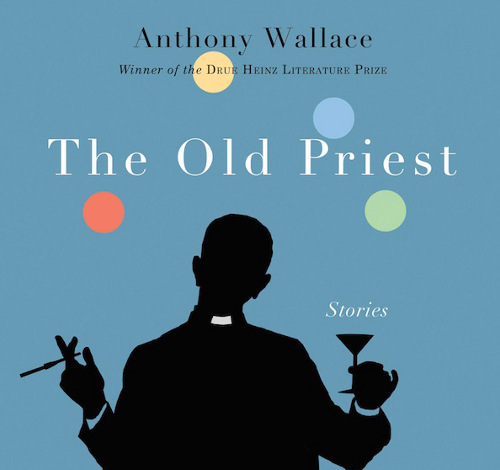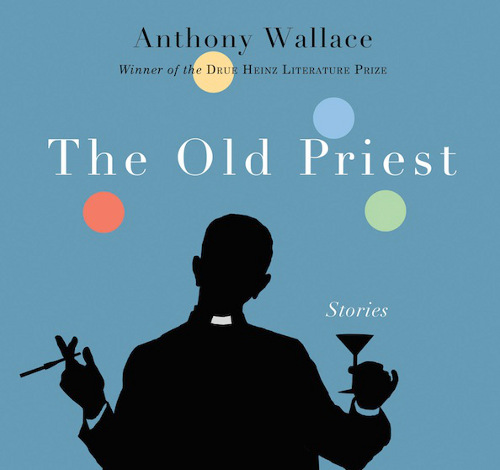
“The state of New Jersey seems to be not much more than a gigantic strip mall.” This reflection comes near the end of Anthony Wallace’s The Old Priest, winner of the Drue Heinz Literature Prize in 2013. The collection’s final story turns a mythic eye to the recent past, when the state was a wild farmland where dinosaurs roamed and a vengeful father unapologetically shoots his son-in-law. Yet “life is not just what you see in front of you,” Wallace writes, “but everything that has happened. History … was taking place all at once.”
Wallace’s characters are casino workers and wandering spouses, drunks and meth-heads, men and women who have been around the block but are not immune to grand romantic gestures. They long for a different future while remaining in the disappointing routines of their present lives. Wallace’s characters are perhaps not people we’d want to know—they muddle through suburban malaise, or find themselves exhausted by disappointment. To escape their dull lives, they grasp at all the wrong things: an exciting affair, the lives of others, drugs, gambling.
Wallace is skilled at the self-rationalizations and contradictions of his characters. Take, for examples, Miles in “The Unexamined Life.” He cheats on his wife, and leaves his son for a woman he’s met in a bar. By the story’s end, though, Miles cannot fully explain why he’s made this decision, and therefore cannot feel wholly guilty for his transgression, nor absolve himself. His life “certainly wasn’t what he’d expected, but he also knew that things were not as dire as they seemed when he tried to describe his life to himself while lying awake at three o’clock in the morning.”
“The Upstairs Room” features a similar series of circumstances—a man leaving his wife—though the piece is slighter, more an anecdote than story. However, Wallace’s writing remains rich, and even in describing the type of woman men pick up in bars, the collection never condescends or moralizes. Those women, Wallace writes, possess a “smile like a horse’s teeth, like they’re trying to outrun whatever life has in store for them, and they know they can but that doesn’t stop them from running all the same, and it doesn’t stop them from enjoying it, either.”
In “Have You Seen This Girl” Christine works at a casino, where she dresses in an X-rated Dorothy costume, while her boyfriend is earning his MFA. When the boyfriend’s sister comes to town—Darcy is a self-destructive actress, a black hole of beauty and egotism—the banality of Christine’s life is thrown into sharp focus. Yes, Darcy “feels so bad, she has to make everyone around her feel bad too,” but she offers an escape, and as readers, we understand why Christine cannot resist the girl’s pull—even as we see the future holds nothing but disaster.
Charlie and his girlfriend are breaking up when they go down to New Mexico in “The City of Gold.” With the much older Charlie, April has been a kept woman, but she finds herself butting against her own powerlessness. “Back in the room Charlie snaps the leash on the dog collar, says giddyap, and then apologizes for mixing his metaphors … It’s what I want, it’s what I think I want. Only it doesn’t do anything for me.” April’s eventual purchase and rescue, in the arms of a young man named Maurice Baltimore, casts a tragic air over her optimism that things will work out.
The collection’s title story, however, is the real standout. A remarkable feat of meta-fiction, spanning decades and with the scope of a novel, “The Old Priest” charts the friendship between a young man and his Jesuit priest mentor. The long story, winner of a Pushcart Prize, is told in the second person, each section segmented and spiraling around the central question: what was the nature of their relationship? “The old priest took an interest in you,” Wallace writes. “Years later you read a few newspaper articles that caused you to see this overweening interest in a somewhat different light.”
The old priest never becomes a type. He is a charming character, full of stories of flamenco dancing in Madrid, encountering Ava Gardner, assisting in the writing of The Exorcist. At the heart of the narrator’s attraction is self-doubt. He has no stories of his own to tell. He brings his girlfriends to meet the old priest; he is asking for approval.
Eventually the narrator does write a book, called The Old Priest, “a short novel … written in the second person” filled with the familiar anecdotes. “You betrayed him,” Wallace writes. “You abandoned him also.”
Long after the old priest’s death, the narrator is still unsure of what to make of their friendship. “Love is love,” Wallace writes, “but resentment is also resentment, and little by little you came to resent the way the old priest continued to look at you, as if he could fix you in a certain moment of our life and experience and keep you there … Just face up to it. Be honest.”
The collection urges its characters, again and again, to accept that there are not always answers to the whys and hows of one’s life. Perhaps, The Old Priest posits, the act of asking the questions is all that matters. History is a flat plane. New Jersey is both farmland and strip malls. Life continues on, as it must, and as it will.
The Old Priest, by Anthony Wallace. Pittsburgh Pennsylvania: University of Pittsburgh Press. 184 pages. $24.95, hardcover.
Brett Beach studies and teaches at Ohio State University, in Columbus. His fiction is forthcoming in The Normal School, The Hopkins Review, and Mount Hope. He is currently at work on a novel.
Check out HFR’s book catalog, publicity list, submission manager, and buy merch from our Spring store. Follow us on Instagram and YouTube. Disclosure: HFR is an affiliate of Bookshop.org and we will earn a commission if you click through and make a purchase. Sales from Bookshop.org help support independent bookstores and small presses.


Leave a comment